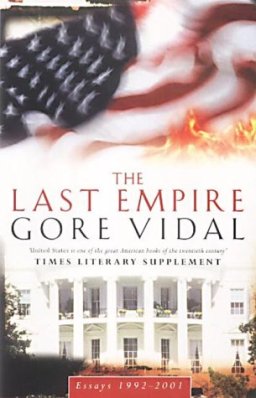Gore Vidal
London: Abacus, 2002, £10.99, p/b
Once upon a time collections of essays by Gore Vidal would appear every few years or so in this country in those neat little Panther paperbacks: On Our Own Now (1976), Matters of Fact and of Fiction (1978), Pink Triangle and Yellow Star (1982) for example. The essays were chiefly literary and historical; occasionally political. Suddenly books of Vidal’s essays are everywhere; and now they’re mostly political. As well as The Last Empire there is also Dreaming War: Blood for Oil and the Cheney-Bush Junta (New York: Thunder’s Mouth Press/Nation Books, 2002, $11.95) and Perpetual War for Perpetual Peace which, I read in The Spokesman 77, contains essays previously published in Vanity Fair and the Nation. Well, so do the other two; and 4 of the 12 essays in Dreaming War also appear in The Last Empire.
This collection is a run-up or preamble to Vidal’s big essay on 9/11, ‘The Enemy Within’, which appeared first in The Observer on 27 October 2002, but which is missing here. In these essays you can follow Vidal on the final stage of his journey from being a kind of patrician, cynical, left-liberal out into parapolitics and even into American conspiracy theory culture.
‘Revisionist historian’ has come to mean people who want to deny the reality of Hitler’s attempt to exterminate the Jews in Europe. Before this use came to dominate, the previous wide use of ‘revisionist historian’ was to describe people, chiefly but not exclusively on the left, who challenged received American history. Vidal is a revisionist essayist and polemicist. He tells us that Roosevelt provoked the Japanese to attack Pearl Harbour and let it happen to get the US into the war; he tells us that the Cold War was created and sustained by the United States; quoting C. Wright Mills, he tells us that the US is run by a ‘power elite’; he tells us that the Clintons were persecuted by a right-wing conspiracy funded by the insurance companies; and in his essay on the Oklahoma bomber, Timothy McVeigh, he quotes the late Ace Hayes of ‘the canny Portland Free Press‘, the Feral House’s Adam Parfey’s Cult Rapture and the conspiracy theorist the late Jim Keith; takes seriously some of the concerns of the militia movement and suggests that McVeigh, despite confessing, might not have done the Oklahoma bomb; that it was a conspiracy by the US state.
‘Evidence…….is overwhelming that there was a plot involving militia types and government infiltrators – who knows? – as prime movers to create panic in order to get Clinton to sign the infamous Anti-Terrorism Act.’ (p. 297)
Evidence of a plot there is. Evidence that the plot existed to force Clinton to sign the act there isn’t.
Though this is all tremendously entertaining, there is one striking blank spot: his belief that the paranoids are right about contemporary America does not extend to the assassinations in the 1960s. Vidal devotes many pages to Timothy McVeigh but only a few lines to the assassination of his friend JFK (and none at all to RFK). Reviewing Seymour Hersh’s The Dark Side of Camelot, he comments on p. 125:
‘Hersh does not take his book where it is logically headed…… the murder in Dallas, and what looks to be a mob killing. Too many lunatics have already checked in on that subject; and Hersh is wise to leave it alone.'(1)
So, by implication, any one else who ignores JFK’s murder would be ‘wise’. Granted there is a lot of poor research and a great many poor books on JFK’s killing, but ‘lunatics’? Vidal doesn’t know what he is talking about; and how striking it is that the only subject in which he recycles received establishment opinion is the death of JFK. This gap has ramifications: for not having studied the assassination he is unaware that JFK changed while in office (this information appears to be understood only within the assassination research community). To Vidal, JFK was charming and witty and with an instrumental view of sex like his own, but also a regular Cold War warrior. He is apparently unaware of Kennedy’s post Cuban Missile Crisis changes – the intention to withdraw from Vietnam and reduce military spending; and his desire for joint exploration of space with the Soviet Union.(2)
Why is he so averse to understanding the assassinations?
It is a great pity that The Observer 9/11 piece isn’t here (it opens Blood for Oil). Without it this witty, beautifully written panorama of American dissent is a movie with the last reel missing.
Notes
1 Hersh’s book is savagely assaulted by Jim DiEugenio in ‘The Posthumous Assassination of John F. Kennedy’ in The Assassinations, reviewed above.
2 On this last little known point see Stephen Birmingham’s account at
< www.birmo.co.uk/jfk/work_in_progress/index.htm >
